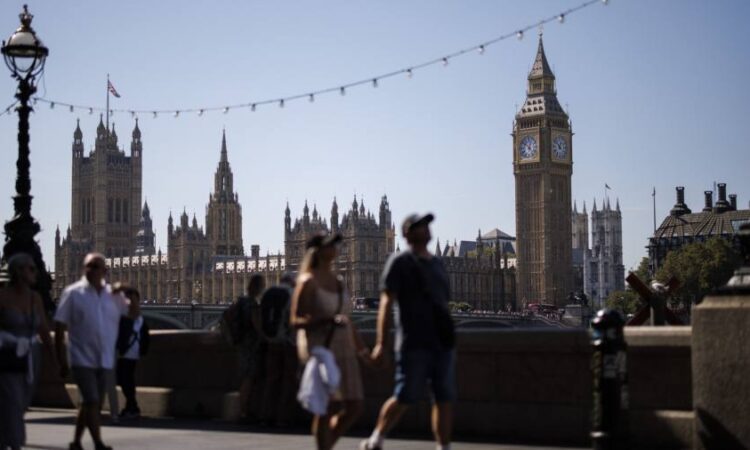
Receive free UK politics updates
We’ll send you a myFT Daily Digest email rounding up the latest UK politics news every morning.
Rishi Sunak has told Chinese premier Li Qiang he has “significant concerns about Chinese interference in the UK’s parliamentary democracy” after two men were arrested under the Official Secrets Act.
The Sunday Times reported that one of the two men was a British parliamentary researcher suspected of spying for China.
The newspaper said this man had links to Conservative MPs including security minister Tom Tugendhat and House of Commons foreign affairs committee chair Alicia Kearns, and previously lived and worked in China. It added the man had held a parliamentary access pass for years.
The two men were arrested on suspicion of espionage-related offences in March by the Metropolitan Police.
The UK prime minister met Li on the margins of the G20 summit in New Delhi. Speaking to journalists, Sunak said he could not comment on the “specifics” of any police investigation but added he had confronted Li over Beijing’s spying in the UK.
“With regard to my meeting with premier Li what I said very specifically is that I raised a range of different concerns that we have in areas of disagreement, and in particular, my very strong concerns about any interference in our parliamentary democracy, which is obviously unacceptable,” said Sunak.
Asked whether now was the time for a closer relationship with China, the prime minister said: “I think our approach is completely aligned with that of our allies.


“If you look at how countries like America, Japan, Canada all engage with China, that’s what they do, because engaging with people allows you to raise concerns directly.”
UK foreign secretary James Cleverly was last month forced to defend how he led the first high level British government visit to Beijing for five years. He warned that failure to engage with China would be a sign of British “weakness”.
But the arrests by the Metropolitan Police are the latest sign of the diplomatic strains between Beijing and western countries over issues ranging from espionage to human rights to Russia’s full scale invasion of Ukraine.
Sir Iain Duncan Smith, former Conservative leader and a leading China “hawk” in the Tory party, said on Sunday the arrest of the man who held a parliamentary access pass suggested a “significant breach in security” at Westminster.
“If you can penetrate parliament like this over such a long period of time . . . then how many other institutions with less levels of security are being penetrated on a daily basis,” he added. “China is determined to undermine the UK.”
Scotland Yard said in a statement on Saturday that an investigation was being carried out by officers from the Metropolitan Police’s counter terrorism command, which has responsibility for probes relating to allegations of breaches of the Official Secrets Act and espionage-related offences.
“Officers from the Metropolitan Police arrested two men on March 13 on suspicion of offences under section one of the Official Secrets Act . . . both men were taken to a south London police station and were released on police bail until a date in early October,” it said.
Section one of the act sets out offences related to espionage, sabotage and related crimes.
The Sunday Times said Tugendhat reportedly had limited contact with the parliamentary researcher, with no dealings with him while security minister.
Tugendhat and Kearns have been approached for comment.
In July parliament’s intelligence and security committee warned that Beijing was targeting the UK “prolifically and aggressively” and said the British government’s response to China’s “increasingly sophisticated” spying operation had been completely inadequate.
The committee found that China’s size, ambition and capability had enabled it to “successfully penetrate every sector of the UK’s economy”.
In January last year British MPs were warned by MI5 that a Chinese agent had been “engaged in political interference activities” in parliament for the Chinese Communist party, including donating more than £420,000 to Labour MP Barry Gardiner.
Christine Ching Kui Lee, a solicitor, was accused by the Security Service of “facilitating financial donations to serving and aspiring politicians” on behalf of foreign nationals based in China and Hong Kong.
China’s foreign ministry said at the time there was “no factual basis” for the idea that Lee worked for the Chinese government.
The Daily Telegraph reported in July that Lee was suing MI5, and denied the Security Service allegations against her.






